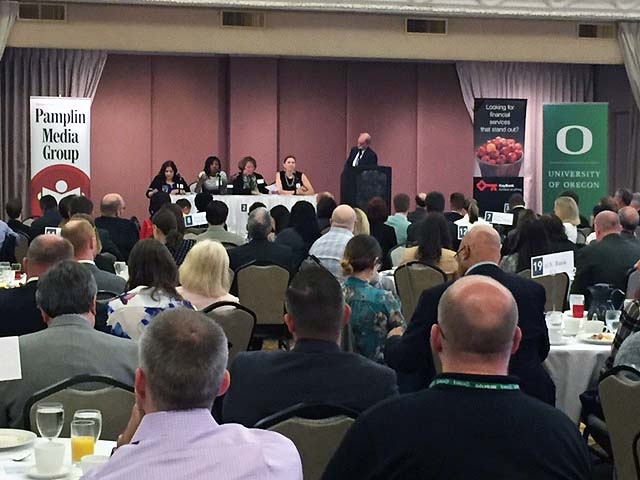Oregon is so white. It’s a demographic “fact” people often take for granted. And statistics show it is no longer true.
“That’s what we typically hear when people start to feel uncomfortable,” said Nichole Maher, president of the Northwest Health Foundation, during a Portland Business Alliance forum June 15. “The reality is we are very diverse.”
The forum featured panelists from the nonprofit and education sectors and focused on the impact of an increasingly diverse state on the workforce, community resources and economic well being.
Here are a few takeaways:
Nichole Maher — President, Northwest Health Foundation
“One of the greatest challenges we have in Oregon is we are still making decisions to allocate resources as if we are the population of 30-40 years ago. When we do that we make bad policy decisions.
“I’m going to be incredibly blunt. One of most common mistakes I see businesses and organizations making, they begin by saying I would like to diversify my workforce, but I just can’t find anyone. Essentially what you’ve done is announce, ‘I don’t know anyone in the community of color … and I probably am not a good place to work.’ It’s really important to understand what are the reasons. Why do you want to diversify your workforce.”
Kali Ladd — Executive Director, KairosPDX
“There is a legacy of trauma and oppression. What we know is that trauma impacts the brain in a very specific way. In the prefrontal cortex, which control impulses. The good thing is brain is plastic, so we can restore the brain. But it takes almost 10,000 positive interactions to counteract a negative one. So we need to create school environments that are not just reaching math … but telling children their cultural identity matters and they belong.
“The solutions are simple, it’s how do we invest in them. If we want to see a difference in the workforce, we really need to focus on this solution.”
Ann Curry-Stevens — Portland State University, assistant professor
“Poverty hurts us all. Our economic engine is slowed when poverty exists. When we have these high levels of unmet people who don’t have money in their pockets to spend on business that would in turn spur economic growth. Low-income earners have the propensity to spend twice the rate of high income earners.”
Carmen Rubio — Executive Director, Latino Network
“Latino is the fastest growing community in Oregon. Between 2000 and 2010 the Latino population more than doubled. Nearly 1 in 4 children under the age of 5 are Latino in Oregon. So what does this mean for Oregon? Employers don’t need to get ready for this shift, it’s already happened. The workforce is behind. “(Businesses need to) demonstrate inclusion in practice not just policy.”




